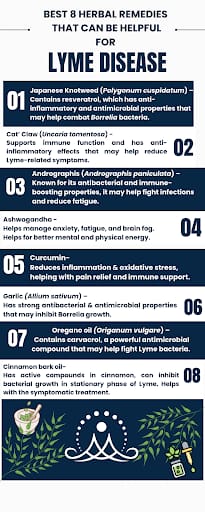
The bacteriaBorrelia burgdorferi,is the main cause of Lyme disease, transmitted through tick bites, and is generally treated with antibiotics. In some cases, patients search holistic and alternative therapies to complement traditional treatments.
But it is important to consult with a doctor beforeincorporating any alternative treatments with prescribed medications(so that there will be no interference between medications).
Let us dive into the article and look forholistic and alternative approaches for Lyme disease.
What are the best holistic therapies for Lyme disease?
Holistic therapies take a comprehensive approach to health, aiming on balancing the emotional, and physical wellbeing. While it works together with medical treatments, it can also be used on its own in some conditions.The main focus of this therapy is to focus on the symptoms of Lyme disease, and assisting the body’s homeostasis (ability to heal itself).
Essential Oils:
- Oregano oil – used as a tick repellant, and natural remedies for tick bites.
- Cinnamon bark oil – avoid bacterial growth in the initial phase of Lyme disease.
- Clove bud oil – have antifungal and antimicrobial effects.
Herbal Remedies:
- Ashwagandha – used to manage anxiety and brain fog.
- Cat claw – acts as an immune booster in case of inflammation.
- Japanese knotweed – have antimicrobial effects.
HBOT (Hyperbaric oxygen therapy):
- Used to prevent bacterial growth, by increasing the level of oxygen in the body.
Saunas & Steam rooms:
- Reduces inflammation and supports the detoxification in the body by increasing body temperature.
Dietary nutrition:
- Antiinflammatory foods like turmeric, garlic, fish, and berries.
- Food for gut health are probiotics and prebiotics.
Managing Stress and Practicing Mindfulness:
- Reducing stress and inflammation in the body can be possible through yoga and meditation.
- Acupuncture helps to treat Lyme disease symptoms.
- Biofeedback balances the nervous system.
How effective are herbal remedies for Lyme disease?
Ashwagandha (Withania somnifera)
- Herb which is used traditionally for managing stress, anxiety, and chronic fatigue.
- In case of Lyme disease, it can manage brain fog and reduce inflammation.
Cat’s Claw (Uncaria tomentosa)
- This herbal remedy has immune boosting properties, which are used to support the immune system and prevent inflammation.
- Supports body’s natural properties to eliminate the Borrelia burgdorferi bacteria.
Japanese Knotweed (Polygonum cuspidatum)
- Herb used to treat Lyme disease, by strong antimicrobial effects.
- This herb targets the bacteria Borrelia burgdorferi, by adding extra support in treating Lyme disease.

Can acupuncture help treat Lyme disease symptoms?
- Acupuncture is a complementary therapy for managing symptoms of Lyme disease, specifically in inflammation reduction.
- Patients with chronic Lyme disease find relief from acupuncture as a part of their holistic symptom treatment, specifically for medical conditions that are difficult to manage with traditional medicine alone.
- Acupuncture has been used to treat: acute and chronic pain due to inflammation associated with Lyme disease.
Contraindications & Precautions of Acupuncture: Generally safe, but it is important to consider patient health conditions and consult with a healthcare professional before starting the session of acupuncture.
When consolidated with complementary treatment for Lyme disease symptoms, acupuncture can promote relief and support the body’s mechanism of healing.

Can detox programs support Lyme disease recovery?
Detox programs play a supportive role in Lyme disease recovery through toxins elimination as the process of detoxification. Without this process, toxins can cause fatigue, headache and muscle pain.
This include:
- Dietary modification – Organic foods can minimize toxins intake.
- Proper Hydration – Having plenty of water can support the kidney to eliminate toxins.
- Sweating Techniques – Saunas or physical exercising promote toxin removal through skin.
While detox programs are effective, they should be used as a complementary treatment, not as replacement, traditional medicines.
Consulting a healthcare specialist is important before initiating any detox producer during Lyme disease treatment, to ensure efficacy and safety.

How can mindfulness help with Lyme disease symptoms?
- Mindful practices can be an important tool in treating Lyme disease.
- One of the main issues of Lyme disease patients is stress and anxiety with frustration comes with chronic symptoms.
- Meditation and yoga can help to activate relaxation of the body, triggered by stress. This reduction of stress can promote overall emotional health and make it easier to manage issues with Lyme disease.
- Many patients of Lyme disease struggle with disruption in sleep.
- Mindful practices can improve sleep quality, such as meditation before going to sleep promotes relaxation , and make it easier to fall asleep. Mindful practices can change the nature of pain, allowing them to be less intense and bearable.
- Cognitive difficulties like “Brain Fog” can alleviate through mindful approaches by improving focus and concentration.
Conclusion
- Practicing holistic and alternative approaches with Lyme disease management to combine with conventional medical treatments is an effective way to recover.
- From detoxification process to acupuncture to dietary changes to mindful procedures, these methods can reduce symptoms associated with Lyme disease and improve overall well-being.
- It is important to seek a healthcare professional’s guidance before starting these therapies to ensure suitability and safety of the patients.
References
- How good nutrition can help you recover from Lyme disease. LymeDisease.org. 2021 Available:Link
- Lyme Disease Treatment | Prognosis for Lyme Patients after Treatment. Johns Hopkins Medicine Lyme Disease Research Center. 2023. Available from: Link
- Calder PC. Omega-3 fatty acids and inflammatory processes: from molecules to man. Biochemical Society Transactions. 2017 Sep 12;45(5):1105–15. Available from: Link
- Van Hal M, Dydyk AM, Green MS. Acupuncture. PubMed. Treasure Island (FL): StatPearls Publishing; 2023. Available: Link
- Peng Y, Ao M, Dong B, Jiang Y, Yu L, Chen Z, et al. Anti-Inflammatory Effects of Curcumin in the Inflammatory Diseases: Status, Limitations and Countermeasures. Drug Design, Development and Therapy. 2021 Nov 2;15:4503–25. Available from: Link


